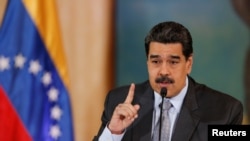The Trump administration on Tuesday imposed sanctions on five Venezuelan security officials and political figures, the latest round of measures taken against Caracas in an effort to oust Venezuelan President Nicolas Maduro.
The officials, who have all previously been targeted for sanctions by the European Union or Canada, have been linked to violence against opposition protesters and to corruption under Maduro's socialist government, the U.S. Treasury Department said in a statement.
Venezuela's information ministry did not respond to a request for comment.
The United States, together with other Western countries, recognizes opposition leader Juan Guaido as the country's legitimate president and has used economic penalties on Venezuela's government and its state oil firm to press Maduro to step down.
Guaido, who leads the opposition-controlled National Assembly, invoked the constitution to assume an interim presidency in January, arguing Maduro's 2018 reelection was a sham. Maduro retains the loyalty of the country's military and is backed by Russia, China and Cuba.
"Treasury is identifying high-level officials acting on behalf of the oppressive regime of former Venezuelan President Nicolas Maduro, which continues to engage in egregious levels of corruption and human rights abuses," Treasury Secretary Steven Mnuchin said.
The five blacklisted individuals include Remigio Ceballos Ichaso, the top operational official in Venezuela's armed forces.
The others are Nestor Neptali Blanco Hurtado, a major in the National Guard; Secretary General of the National Defense Council Jose Adelino Ornelas Ferreira; Pedro Miguel Carreno Escobar, a deputy of the government-controlled National Constituent Assembly; and Carlos Alberto Calderon Chirinos, a senior intelligence official.
The sanctions freeze any assets the officials hold in the United States and prohibit U.S. citizens from doing business with them.
"While Maduro and his associates continue to enrich themselves, the Venezuelan people suffer brutality, violence, and oppression at the hands of the intelligence, security, and armed forces," U.S. Secretary of State Mike Pompeo said in a





